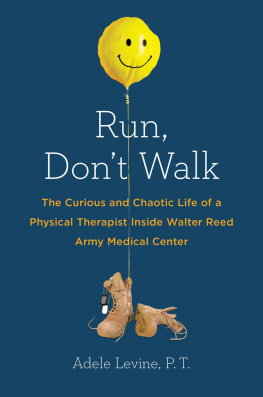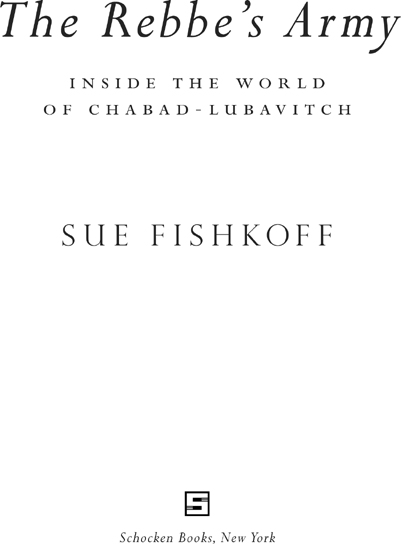1. FROM BROOKLYN TO YOUR LIVING ROOM:
Cornering the Jewish Outreach Market
2. WE'VE GOT BOCA COVERED!:
Chabad Hits South Florida
3. TAKING IT TO THE STREETS:
Mitzvah Tanks, Tefillin, and Talking to Strangers
4. THE REBBE:
The Enigma of Menachem Mendel Schneerson
5. TORAH AND CHICKEN SOUP:
Chabad on Campus
6. NEW KIDS ON THE BLOCK:
Chabad Moves into Your Town
7. THE FROZEN CHOSEN:
Looking for Gold in Alaska
8. HOLY DIP:
Mikvah Makes a Comeback
9. SHOW ME THE MONEY:
Raising Funds and Influencing People
10. FRIENDS IN HIGH PLACES:
Washington, D.C.
11. LONESOME COWBOYS:
Salt Lake City, Portland, and a Seder in Bangkok
12. FROM GRANOLA TO GOD:
The Ba'alei Teshuvah
13. GOD'S LITTLE SOLDIERS:
Educating the Next Generation
14. WE WANT MOSHIACH NOW!:
Dealing with the Rebbe's Death
15. CHANUKAH, O CHANUKAH:
The Flap over Public Menorahs
16. ADDICTS, INMATES, AND OTHER JEWS:
Serving the Underserved
Prologue
It was a rainy November afternoon in 1993 when I got the phone call from Lubavitch headquarters in Crown Heights, Brooklyn. I was in my second year as the Jerusalem Post's New York correspondent, and although I had reported briefly on the Lubavitcher Rebbe's illness, I had not yet been to Crown Heights and I knew very little about the Hasidic movement he led.
The voice on the other end of the line belonged to Zalman Shmotkin, ad hoc spokesman and press liaison for Lubavitch in New York. Can I come to your office? he asked. His voice sounded strained, as if something were weighing heavily on his heart.
Zalman showed up a few hours later, a young red-haired man with a wispy beard and wire-rimmed glasses, dressed in a plain white shirt, dark suit, and black hat. I had never met a Hasid before. I'd seen them many timeson the streets of Jerusalem and New York, on the subways, on Forty-seventh Street, in the camera stores near Penn Station. I'd studied about them in Jewish history classes, I'd read Martin Buber's Tales of the Hasidim, I'd seen Fiddler on the Roof. The image I'd come away with was of a shadowy, insular world filled with Shabbos tables, dietary restrictions,and one-way conversations with God. I'd grown up in a secular household in New Jersey, and Hasidim were very far removed from my reality. They were intriguing, mysterious, but ultimately alien.
Zalman began to talk, telling me about his rebbe. Menachem Mendel Schneerson, the ninety-one-year-old grand rabbi of the worldwide Luba-vitch movement, had suffered a debilitating stroke twenty months earlier and was no longer able to speak. He was being cared for and protected by his closest aides who, themselves devastated by their leader's incapacitation, were struggling to keep the movement together while fending off a dangerous messianic tendency that was fast gaining ground among the Rebbe's followers.
But Zalman wasn't talking about that. He spoke to me, instead, of his rebbe's teachings. He told me what this holy man meant to him personally. He spoke for more than an hour, passionately, openly, talking about the nature of the human soul, the fabric of existence, the love God has for all creation. His eyes, already reddened when he arrived, filled with tears. He let them run down his cheeks, uncaring. As I listened to this Hasid lay bare his soul in front of me, I was deeply moved. Who was this Rabbi Schneerson to inspire such devotion? Why did I feel so stirred, so strangely elevated by the ideas this young man put forward in his name? We were from very different worlds, he and I, but in that moment I felt deeply connectedto what, exactly?
A few months later I spent a Sabbath in Crown Heights. It was, during those years, almost a required trip for Jewish reporters who covered the New York area, and it was arranged by Lubavitch headquarters: Shabbos with a Lubavitcher family, going to the great synagogue at 770 Eastern Parkway, staying up late Friday night singing Hasidic songs, and making l'chaims around the holiday table. It was supposed to show us, of course, that Hasidim are people, too, so we shouldn't disparage them out-of-hand in our reporting. But it's also part of Lubavitch outreach; if they're looking to kindle the spiritual sparks in every Jew, why not in Jewish reporters?
When I stepped out of the subway onto the corner of Eastern Parkway and Kingston Avenue, I was taken aback. There I was, right in front of 770, Lubavitch central. It was late Friday afternoon and people were rushing here and there, finishing their last weekday errands before sunset brought a halt to all work and Shabbat descended on Crown Heights. I saw crowds of men in black hats and suits, going in and out of the synagogue, and I felt very exposed. I didn't fit in here. Surely they were all looking at me, wondering what I was doing in their neighborhood. This was not my home. These were not my people.
Since that first visit I've been back to Crown Heights many times and have reported on Chabad activities around the world for Moment, the Jerusalem Post, and other Jewish publications. I discovered that no one in the Jewish world is neutral about Chabad. Everyone has an opinion, and much of the time it's not very flattering. One editor of a Jewish newspaper called me to say Chabad was taking over the city where she lived. What does that mean? Are they running the other rabbis out of town with shotguns? Are they multiplying so quickly that they're skewing the Jewish demographics? Hardly. And yet over and over I've heard the same warning, sometimes delivered in a whisper, sometimes in an exasperated shout: They're taking over. But what exactly are they taking over? And who's letting them do it?
I spent more than a year researching this book, traveling to Chabad Houses throughout the United States to spend time with Chabad shlichim, the movement's outreach emissaries. I spent weekends with them, sleeping in their homes, sharing their food, playing with their children. Without exception, they opened their lives to me with incredible generosity. More than once I slept in rooms crowded with cribs and toddler beds and realized the youngsters I'd displaced were bunking down with older siblings, or sleeping in their parents' beds while I was there.
I began watching my clothingam I modestly dressed? Is my skirt long enough, my neckline high enough? No Lubavitcher would expect me to adhere to their fashion dictates, but I wanted to indicate my respect, andit's trueI was also hoping to lull them into revealing more of themselves than they would to a casual outsider. I doubt that it worked, but I'll never know for sure.









